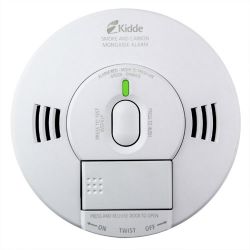Carbon Monoxide charity raises the alarm

[skus]DET014CMD1,DET014CMD2[/skus]
This week from 19th to 26th November marks the launch of Carbon Monoxide Awareness Week an annual event organised by Lynn Griffiths the founder of the Carbon Monoxide Awareness charity. Organisations working in the community, particularly those involved with home visits to vulnerable groups will be urged to raise the general awareness of the dangers associated with the highly poisonous gas carbon monoxide.
There have been some high profile cases of fatalities over the years, notably in holiday lets, but even low level exposure to carbon monoxide (CO) can cause severe illness and death if left undetected – and given that CO is colourless and odourless detection is only possible through the use of purpose made Carbon Monoxide Detectors.

Recognising the symptoms of CO poisoning is also difficult. Headache, nausea and vomiting and a general feeling of malaise are indicators of low level CO exposure. As these symptoms can easily be misdiagnosed as more common ailments, such as flu or gastroenteritis the possibility of CO poisoning being the cause may be overlooked. There is also evidence to suggest permanent neurological damage can be caused by such exposure.
The Fire and Rescue Services have done a great job in convincing householders of the merits of fitting smoke alarms to detect fires before they develop. It might make sense to extend the subsidised scheme that provides free Smoke Alarms to also include Carbon Monoxide detectors.
Carbon monoxide is produced by the incomplete combustion of carbon-containing fuels, including gas, coal, charcoal, coke, heating oil and wood, so any household with carbon fuel heating and cooking appliances is potentially at risk. That risk is greatly increased around this time of year when usage of central heating appliances and open fires rises, so it is doubly important to get your heating system serviced and if you have one, your chimney swept.
We recommend Domestic Gas and Liquefied Petroleum Gas (LPG) powered appliances should be serviced by a Gas Safe registered engineer who is qualified to work with LPG and Solid fuel appliances serviced by a solid fuel HETAS registered engineer. Oil fuelled appliances should be serviced by an OFTEC registered engineer.
Installing an audible 85 decibel carbon monoxide alarm that meets the British or European Standards will raise the alarm before gas levels exceed accepted safe concentrations. You can also purchase a combined smoke and carbon monoxide detector with spoken voice alarm that gives a loud verbal warning. If you have elderly, infirm or vulnerable relatives or friends that may be at risk pay them a visit and help the Charity by raising the issue and checking they have CO safeguards in place.
